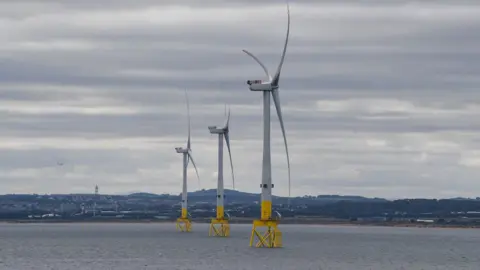New wind farms' impact to be 'felt for generations'
 Getty Images
Getty ImagesNew floating wind farms capable of powering millions of homes will have "a positive impact for generations to come," a minister has said.
The UK government has announced the companies that will develop major new windfarms in the sea off the coasts of south Wales and south-west England.
Thousands of jobs will be created in the process of building the turbines, which could be up to 300m (984ft) tall, sit on a football pitch-sized platform and be capable of powering four million homes in the UK.
Port Talbot and Bristol are the likely locations for assembly of the turbines, and it is predicted they could be operational by the early 2030s.
Working with the Crown Estate, Equinor and Gwynt Glas – a joint venture between EDF Renewables UK and ESB – will create several windfarms which are expected to be some of the largest of their type in the world.
The Crown Estate – which manages the seabed around England, Wales and Northern Ireland – is investing £400m in the UK's offshore wind supply chain.
Profits of the Crown Estate - a property business owned by the monarch but run independently - go to the Treasury.
The level of profit is used as a benchmark to calculate the funding given by the government to the Royal Family in the Sovereign Grant.
The Crown Estate owns more £603m of land in Wales, which includes 65% of Wales' coast and riverbeds, the seabed up to 12 miles (19km) out to sea, and 50,000 acres of land.
The project could support the creation of 5,300 new jobs and deliver a £1.4bn boost to the UK economy.
The companies said they were committed to ensuring that a minimum of 10% of employees aged 19 to 24 were not currently in education, employment or training.
Ministers are predicting the windfarms could be operational in the early 2030s and will be offering "jobs, lower energy bills and energy security from a clean and renewable source".
Welsh Secretary Jo Stevens said the project was "hugely significant" for the clean energy industry.
She added the windfarms would be "far out to sea" and probably not visible from land.
Energy Secretary Ed Miliband said it would be "transformative" for economic growth in Wales and the south-west.
He added: "Unlocking thousands of jobs in places like Port Talbot and Bristol, bolstering our energy security and delivering industrial renewal."
Rebecca Williams, director for Wales at the Crown Estate, told BBC Radio Wales Breakfast some jobs would be in roles building the turbines.
First Minister Eluned Morgan said: "Obviously the first thing we'll be doing as a government is picking up the phone to those companies and saying 'right, how do we work together to maximise the number of jobs for Wales?"
A sustainability consultant from St Davids in Pembrokeshire described it as "fantastic news for future generations".
Andy Middleton added: "Any young people, young boys and girls that are now 14 or 15 will be in their mid 20s by the time that these projects go live.
"So there's a real need to help young people get excited about the possibilities of working in fields like this where the whole of the UK energy system is going to be driven by electricity going forwards."
Plaid Cymru's energy spokeswoman Llinos Medi MP said the Welsh government's efforts to ensure Wales gets a fair deal "have not been effective".
"The fees and profits from this announcement will be given to the Treasury in Whitehall rather than being retained for the Welsh public purse," she added.
It comes after Eluned Morgan said she will "call out" Labour in Westminster when it "gets it wrong for Wales".
Samuel Kurtz, the Welsh Conservatives' energy spokesman, welcomed the proposal but said there was a lack of detail and guarantees surrounding its implementation.
He added it was "essential that Welsh ports are placed at the forefront for the assembly, operation, and maintenance of these wind farms" so Wales benefitted from the full economic impact of the scheme.
The Welsh Liberal Democrat leader, Jane Dodds, welcomed the prospect of new jobs but also criticised the UK government for refusing to devolve the Crown Estate.
She added: "The money raised from these renewable projects will continue to flow out of Wales and go directly to London instead of directly benefiting Welsh communities."
Analysis - BBC Wales political editor Gareth Lewis
While welcoming the "brilliant" news, Jo Stevens also stepped into the teeth of a political storm that's been blowing for some time.
Today's announcement was "vindication" for not devolving control of the Crown Estate from the UK government to Wales, she said.
Welsh Labour, Plaid Cymru and all Welsh councils want it controlled here, as it is in Scotland, which means the Scots keep some of the revenue generated to invest locally, rather than see it go the Treasury in London.
For some it is more than the money: It is also a question of fairness.
On the scheme itself, there are still some unanswered questions, including how many jobs will be created in Wales specifically and the exact role that the port of Port Talbot might play.
